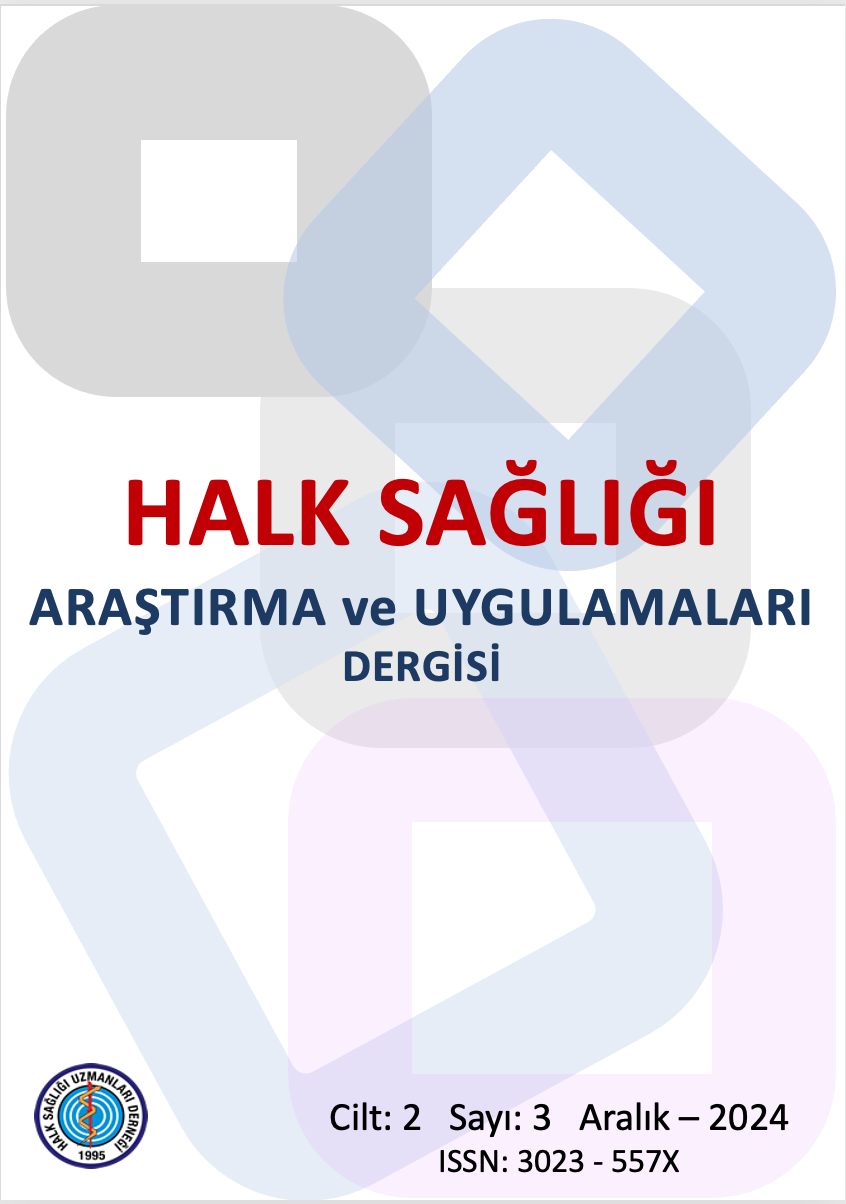Awareness of ecological footprint among VIth grade students of a medical faculty
DOI:
https://doi.org/10.5281/zenodo.14615561Keywords:
Ecological Footprint, VIth Grade Student, Trakya UniversityAbstract
Almost a quarter of all causes of death globally are attributed to environmental problems. Determining the awareness of healthcare professionals regarding environmental problems is necessary in the management of potential health problems. The aim of this study is to determine the ecological footprint awareness of senior medical school students. The research has a cross-sectional design and was conducted with 6th year students of Trakya
University Faculty of Medicine. The data collection tools are a questionnaire form developed by the researchers and the Ecological Footprint Reduction Awareness Scale (EFRAS). The mean EFRAS score of the research group is 110.7±13.6 (minimum: 82.0, maximum: 130.0). Total scale scores of
the participants who are male, Turkish nationals, those who do not have chronic diseases, those whose mothers are highly educated, those who prefer individual vehicles for transportation, those who rarely consume unnecessary goods, and those who said “I dispose of waste by separating it” and “Ergene River poses a health risk” were calculated higher than the others. The difference between the total scale scores of the participants who said “I dispose of waste by separating it” and “Ergene River poses a health risk” was found to be statistically significant. This study shows that the ecological footprint awareness of the senior medical school students varies significantly depending on factors such as gender, educational status of parents, transportation preferences, consumption habits and participation in environmental activities. It emphasizes the importance of targeted education programs and behavioral changes to increase environmental awareness.
References
Ukaogo PO, Ewuzie U, Onwuka CV. Environmental pollution: causes, effects, and the remedies. Öğrencilerin Ekolojik Ayak izi Farkındalığı Microorganisms for sustainable environment and health: Elsevier; 2020. p. 419-29.
Duman FK, Atabek-Yiğit E. Spor bilimleri fakültesi öğrencilerinin ekolojik ayak izi farkındalıkları. Gazi Beden Eğitimi ve Spor Bilimleri Dergisi. 2022;27(4):265-80.
Rapport D. Ecological footprints and ecosystem health: complementary approaches to a sustainable future. Ecological Economics. 2000;32(3):367-70.
UÇEP. Mezuniyet Öncesi Tıp Eğitimi Ulusal Çekirdek Eğitim Programı 2020 - Davranışsal, Sosyal ve Beşeri Bilimler Listesi 2020 [05.04.2024]. Available from: https://www.yok.gov.tr/Documents/Kurumsal/egitim_ogretim_dairesi/Ulusal-cekirdek-egitimi-programlari/mezuniyet-oncesi-tip-egitimi-cekirdek-egitimi-programi.pdf.
Eraslan Ş, Seçme D. Mimarlık fakültesi öğrencilerinin ekolojik ayak izi farkındalık düzeyi. Süleyman Demirel Üniversitesi Fen Bilimleri Enstitüsü Dergisi. 2021;25(3):481-91.
Sivrikaya Ş. Fen bilgisi ve Türkçe öğretmen adaylarının ekolojik ayak izi farkındalık düzeylerinin belirlenmesi. 2018.
Özdemir O, Yıldız A, Ocaktan E, Sarışen Ö. Tip fakültesi öğrencilerinin çevre sorunlari konusundaki farkindalik ve duyarliliklari. Ankara Üniversitesi Tıp Fakültesi Mecmuası. 2004;57(3).
Tekindal, M. A., Zabzun, G., Özel, Z., Demirsöz, M. & Tekindal, M. (2021). Awareness Scale for Reducing Ecological Footprint: A Validity and Reliability Study. European Journal of Science and Technology, (27), 439-445.
Özer Z. Ekolojik ayak izleri. Bilim ve Teknik Dergisi. 2002;419(1):82-4.
Çam H, Menteşe FG. Sağlık Çalışanlarının Ekolojik Ayak İzi Azaltılması Konusundaki Eğilimlerinin İncelenmesi. Gümüşhane Üniversitesi Sosyal Bilimler Dergisi. 2024;15(2):483-97.
Yıldız TK, Ulusoy H, Sarıçoban S. Sağlık Bilimleri Fakültesi Öğrencilerinin Ekolojik Ayak İzi Farkındalıkları ve Çevre Okuryazarlığı Düzeylerinin Belirlenmesi. Cumhuriyet Üniversitesi Sağlık Bilimleri Enstitüsü Dergisi. 2023;8(3):476-83.
Ryan EC, Dubrow R, Sherman JD. Medical, nursing, and physician assistant student knowledge and attitudes toward climate change, pollution, and resource conservation in health care. BMC Medical Education. 2020;20:1-14.
Baydar V, Ersoy AF, Ongun H. Üniversite öğrencilerinin çevresel farkındalık düzeylerinin bazı sosyodemografik değişkenlere ve algılanan yetiştirme stillerine göre incelenmesi. Türkiye Sosyal Araştırmalar Dergisi. 2022;26(1):165-82.
Quitmann C, Sauerborn R, Danquah I, Herrmann A. Reducing the carbon footprint of a German university hospital: Perspectives from hospital stakeholders. The Journal of Climate Change and Health. 2023;12:100247.
Luque-Alcaraz OM, Aparicio-Martínez P, Gomera A, Vaquero-Abellán M. The environmental awareness of nurses as environmentally sustainable health care leaders: a mixed method analysis. BMC nursing. 2024;23(1):229.
Chanioti M, Nikolelis G, Mitsika I, Antoniadou Μ. The Dentist's Role in Cultivating Environmental Awareness for Sustainability and promotion of Climate Consciousness. 2024. DOI:10.20944/preprints202405.1372.v1
Wang J, Li S, He B. Chinese physicians’ attitudes toward eco-directed sustainable prescribing from the perspective of ecopharmacovigilance: a cross-sectional study. BMJ open. 2020;10(6):e035502.
Duman Z. Tüketimci kapitalizmin ve tüketim kültürünün eleştirisi. Sosyoloji Dergisi. 2016(33):15-36.
Downloads
Published
How to Cite
Issue
Section
License
Copyright (c) 2025 HALK SAĞLIĞI ARAŞTIRMA VE UYGULAMALARI DERGİSİ

This work is licensed under a Creative Commons Attribution-NonCommercial 4.0 International License.


